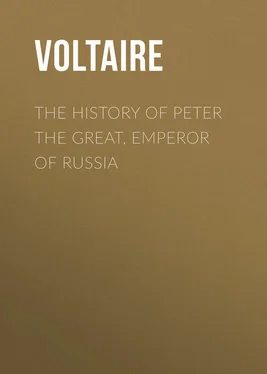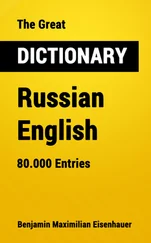Voltaire - The History of Peter the Great, Emperor of Russia
Здесь есть возможность читать онлайн «Voltaire - The History of Peter the Great, Emperor of Russia» — ознакомительный отрывок электронной книги совершенно бесплатно, а после прочтения отрывка купить полную версию. В некоторых случаях можно слушать аудио, скачать через торрент в формате fb2 и присутствует краткое содержание. Жанр: История, literature_18, foreign_prose, на английском языке. Описание произведения, (предисловие) а так же отзывы посетителей доступны на портале библиотеки ЛибКат.
- Название:The History of Peter the Great, Emperor of Russia
- Автор:
- Жанр:
- Год:неизвестен
- ISBN:нет данных
- Рейтинг книги:3 / 5. Голосов: 1
-
Избранное:Добавить в избранное
- Отзывы:
-
Ваша оценка:
- 60
- 1
- 2
- 3
- 4
- 5
The History of Peter the Great, Emperor of Russia: краткое содержание, описание и аннотация
Предлагаем к чтению аннотацию, описание, краткое содержание или предисловие (зависит от того, что написал сам автор книги «The History of Peter the Great, Emperor of Russia»). Если вы не нашли необходимую информацию о книге — напишите в комментариях, мы постараемся отыскать её.
The History of Peter the Great, Emperor of Russia — читать онлайн ознакомительный отрывок
Ниже представлен текст книги, разбитый по страницам. Система сохранения места последней прочитанной страницы, позволяет с удобством читать онлайн бесплатно книгу «The History of Peter the Great, Emperor of Russia», без необходимости каждый раз заново искать на чём Вы остановились. Поставьте закладку, и сможете в любой момент перейти на страницу, на которой закончили чтение.
Интервал:
Закладка:
This race of people, who are inconsiderable in numbers, have but very few ideas, and are happy in not having more, which would only occasion them to have new wants which they could not satisfy: at present they live contented, and free from diseases, notwithstanding the excessive coldness of their climate; they drink nothing but water, and attain to a great age. The custom imputed to them of entreating strangers to lie with their wives and daughters, which they esteem as an honour done to them, probably arose from a notion of the superiority of strangers, and a desire of amending, by their means, the defects of their own race. This was a custom established amongst the virtuous Lacedemonians. A husband would entreat a favour of a comely young man, to give him handsome children, whom he might adopt. Jealousy, and the laws, prevent the rest of mankind from giving their wives up to the embraces of another; but the Laplanders have few or no laws, and are in all probability, strangers to jealousy.
Ascending the river Dwina from north to south, we travel up the country till we come to Moscow, the capital of the empire. This city was long the centre of the Russian dominions, before they were extended on the side of China and Persia.
Moscow, lying in 55 degrees and a half, north latitude, in a warmer climate, and more fruitful soil than that of Petersburg, is situated in the midst of a large and delightful plain on the river Moskwa, and two lesser rivers, which with the former lose themselves in the Occa, and afterwards help to swell the stream of the Wolga. This city, in the 13th century, was only a collection of huts inhabited by a set of miserable wretches, oppressed by the descendants of Gengis Khan.
The Kremlin, or ancient palace of the great dukes, was not built till the 14th century; of such modern date are cities in this part of the world. This palace was built by Italian architects, as were several churches in the Gothic taste which then prevailed throughout all Europe. There are two built by the famous Aristotle, of Bologna, who flourished in the 15th century; but the private houses were no better than wooden huts.
The first writer who brought us acquainted with Moscow, was Olearius; who, in 1633, went thither as the companion of an embassy from the duke of Holstein. A native of Holstein must naturally be struck with wonder at the immense extent of the city of Moscow, with its five quarters, especially the magnificent one belonging to the czars, and with the Asiatic splendour which then reigned at that court. There was nothing equal to it in Germany at that time, nor any city by far so extensive or well peopled.
On the contrary, the earl of Carlisle, who was ambassador from Charles II. to the czar Alexis, in 1633, complains in his relation that he could not meet with any one convenience of life in Moscow; no inns on the road, nor refreshments of any kind. One judged as a German, the other as an Englishman, and both by comparison. The Englishman was shocked to see most of the Boyards or Muscovite noblemen, sleep upon boards or benches, with only the skins of animals under them; but this was the ancient practice of all nations. The houses, which were almost all built of wood, had scarcely any furniture, few or none of their tables were covered with cloth; there was no pavement in the streets; nothing agreeable; nothing convenient; very few artificers, and those few extremely awkward, and employed only in works of absolute necessity. These people might have passed for Spartans, had they been sober.
But, on public days, the court displays all the splendour of a Persian monarch. The earl says, he could see nothing but gold and precious stones on the robes of the czar and his courtiers. These dresses were not manufactured in the country; and yet, it is evident, that the people might be rendered industrious long before that time. In the reign of the czar Boris Godonow, the largest bell was cast at Moscow, in Europe; and in the patriarchal church there were several ornaments in silver, worked in a very curious manner. These pieces of workmanship, which were made under the direction of Germans and Italians, were only transient efforts. It is daily industry, and the continual exercise of a great number of arts, that makes a nation flourishing. Poland, and the neighbouring nations, were at that time very little superior to the Russians. The handicraft trades were not in greater perfection in the north of Germany, nor were the polite arts much better known, than in the middle of the seventeenth century.
Though the city of Moscow, at that time, had neither the magnificence nor arts of our great cities in Europe, yet its circumference of twenty miles; the part called the Chinese town, where all the rarities of China are exhibited; the spacious quarter of the Kremlin, where stood the palace of the czars; the gilded domes, the lofty and conspicuous turrets; and, lastly, the prodigious number of its inhabitants, amounting to near 500,000. All this together, rendered Moscow one of the most considerable cities in the world.
Theodore, or Fœdor, eldest brother to Peter the Great, began to improve Moscow. He ordered several large houses to be built of stone, though without any regular architecture. He encouraged the principal persons of his court to build, advancing them sums of money, and furnishing them with materials. He was the first who collected studs of fine horses, and made several useful embellishments. Peter, who was attentive to every thing, did not neglect Moscow at the time he was building Petersburg; for he caused it to be paved, adorned it with noble edifices, and enriched it with manufactures; and, within these few years, M. de Showalow, high chamberlain to the empress Elizabeth, daughter to Peter the Great, has founded an university in this city. This is the same person who furnished me with the memorials, from which I have compiled the present history, and who was himself much more capable to have done it, even in the French language, had not his great modesty determined him to resign the task to me, as will evidently appear from his own letters on this subject, which I have deposited in the public library of Geneva.
Westward of the duchy of Moscow, is that of Smolensko, a part of the ancient Sarmatia Europea. The duchies of Moscow and Smolensko composed what is properly called White Russia. Smolensko, which at first belonged to the great dukes of Russia, was conquered by the great duke of Lithuania, in the beginning of the fifteenth century, and was retaken one hundred years afterwards by its old masters. Sigismund III. king of Poland, got possession of it in 1611. The czar Alexis, father of Peter I. recovered it again in 1654, since which time it has always constituted part of the Russian empire. The panegyric of Peter the Great, pronounced in the academy of sciences at Paris, takes notice, that before his time the Russians had made no conquests either to the west or south; but this is evidently a mistake.
Between Petersburg and Smolensko, lies the province of Novogorod; 8 8 Grod, or gorod, signifies city in the Russian language.
and is said to be the country in which the ancient Slavi , or Sclavonians, made their first settlements. But from whence came these Slavi , whose language has spread over all the north-east part of Europe? Sla signifies a chief, and slave one belonging to a chief. All that we know concerning these ancient Slaves is, that they were a race of conquerors; that they built the city of Novogorod the Great, at the head of a navigable river; and that this city was for a long time in possession of a flourishing trade, and was a potent ally to the Hanse Towns. Czar Iwan Wassiliawitsch (or John Basilowitz) made a conquest of it in 1467, and carried away all its riches, which contributed to the magnificence of the court of Moscow, till then almost unknown.
Интервал:
Закладка:
Похожие книги на «The History of Peter the Great, Emperor of Russia»
Представляем Вашему вниманию похожие книги на «The History of Peter the Great, Emperor of Russia» списком для выбора. Мы отобрали схожую по названию и смыслу литературу в надежде предоставить читателям больше вариантов отыскать новые, интересные, ещё непрочитанные произведения.
Обсуждение, отзывы о книге «The History of Peter the Great, Emperor of Russia» и просто собственные мнения читателей. Оставьте ваши комментарии, напишите, что Вы думаете о произведении, его смысле или главных героях. Укажите что конкретно понравилось, а что нет, и почему Вы так считаете.












